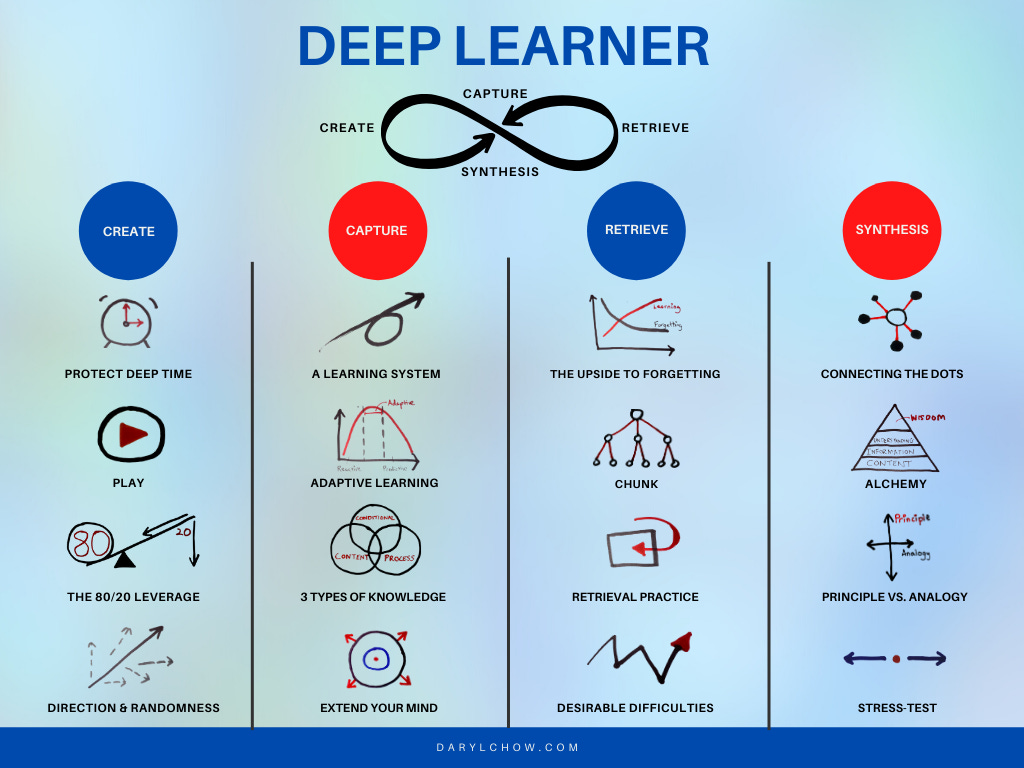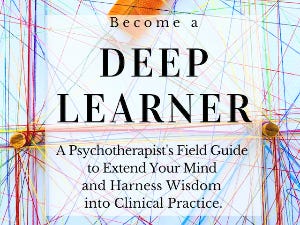Frontiers Friday #95: Emotions (Part I) ⭕

Frontiers Friday #95. Emotions (Part I)
You don't have to be an "emotion-focused" therapist, or an "emotionally-focused" therapist to work with emotions. In fact, avoiding the topic of emotions in psychotherapy is like a fisherman avoiding the waters.
This week and the coming few, we will be talking about the life-blood of our human experience, that is, the inner-life of Emotions.
Today we have one new post and a string of recommendations from the esteemed psychologist, Lisa Feldman Barrett.
🎁 New from My Desk: Why You Need a Guide To Go Deep
In this new post, I shared my experience about being at a therapy workshop, what I've learned from Les Greenberg, and why a slow, soft and singular focus is needed in approaching difficult emotions in therapy.
📕 Book-Read: How Emotions Are Made
Hands down, this is book by Lisa Feldman Barrett is probably one of the most important (and current) text on the topic of emotions.
While compiling this, I found out from another version of this book that Dan Gilbert called Feldman Barrett "...the deepest thinker about this topic since Darwin."
After you've read this book, you'd know why. Feldman Barrett turned my world upside down.
Key Grafs:
- An emotion is your brain’s creation of what your bodily sensations mean, in relation to what is going on around you in the world.
- Contrast the classical view of emotions, the theory of Constructed Emotions is
- "Your emotions are not built-in but made from more basic parts. They are not universal but vary from culture to culture. They are not triggered; you create them."
- "Emotions are real, but not in the objective sense that molecules or neurons are real. They are real in the same sense that money is real — that is, hardly an illusion, but a product of human agreement."
- "You are not a passive receiver of sensory input but an active constructor of your emotions."
- Variation is the norm.
- Body budget: "The most basic thing you can do to master your emotions, in fact, is to keep your body budget in good shape... If they aren’t, and your body budget gets out of whack, then you’re going to feel crappy no matter what self-help tips you follow. It’s just a matter of which flavor of crap."
👓 Web-Read: Facial Expressions Do Not Reveal Emotions
One of the most compelling arguments Lisa Feldman Barrett makes is in Chapter 3, The Myths of Universal Emotions. Here, she challenged the classical view in the likes of Paul Ekman universal facial expression.
In this American Scientific article, LFB provides a glimpse into this argument. Worth reading.
Key Grafs:
- “There’s also considerable evidence that facial movements are just one signal of many in a much larger array of contextual information that our brain takes in. Show people a grimacing face in isolation, and they may perceive pain or frustration. But show the identical face on a runner crossing the finish line of a race, and the same grimace conveys triumph. The face is often a weaker signal of a person’s internal state than other signals in the array,"
- "People may indeed widen their eyes and gasp in fear, but they may also scowl in fear, cry in fear, laugh in the face of fear and, in some cultures, even fall asleep in fear. There is no essence (on Essentialism).”
- "Other scientists point to a mountain of counterevidence showing that facial movements during emotions vary too widely to be universal beacons of emotional meaning. People may smile in hatred when plotting their enemy’s downfall and scowl in delight when they hear a bad pun."
🎧 Listen: Balancing the Body Budget
If you prefer to listen, check out several of LFB podcast interviews. This is one of them on The Knowledge Project by Shane Parrish.
Key Grafs:
- When it comes to emotion, as with almost everything in biology, variation is the norm. There isn’t one anger. You have a whole population of angers that you can feel and your brain doesn’t conjure them randomly. It conjures them according to your brain’s best guess of what’s going to work in a particular situation.
- The brain: most expensive metabolic budget (20%). When brain depletes, less budget for the body to move.
- Fallacy that emotions trip you up: Sometimes thinking trip you up too; false dichotomy of logical vs emotional brain... "you have one brain."
⏸ Words Worth Contemplating:
"The body doesn't keep the score. Your brain keeps the score. Your body is the score."
~ Lisa Feldman Barrett
Reflection:
HALT. Take a moment to check your body budget. Are you Hungry, Angry, Lonely, Tired?
(hat-tip to Emma D)
We make all kinds of psychological attempts to improve our wellbeing, and often fail to ask a more fundamental question. How is our body feeling?

If there was a skill that has the highest impact in accelerating your ability, without a doubt, one of them is the ability to learn well.
The Deep Learner online course is one that I'm really proud of... and it's also one that many assume that they don't have much troubles with!
Part of the reason is because many of the ways to improve learning are somewhat counter-intuitive, like forgetting is actually good for learning; testing yourself before exposing to the contents of a topic drastically boosts your learnings, and so on...
The Deep Learner course is based on these 4 tenets:

And here's an overview on what's covered:

Maybe it's because of my past troubles in the education system, I am deeply interested to help others in the helping profession learn more sensibly and transfer what they learn (isn't that what learning is for?). In other words, become deep learners themselves.
You see, not only do we neglect what we’ve learned, but we fail to transfer our learnings when we need it most. So we go on to acquire more new knowledge, strategies and tricks that doesn't seem to stick and synthesise.
From now til the end of Jun'22, the Deep Learner is price reduced from AUD$ 485 to AUD$291 (That's a 40% savings of $194).
PLUS, if you hit reply to this email, I will give you not only this 40% discount code, but another unique promo code for a friend/colleague to sign up for FREE!
In other words, 40% discount + free pass for someone you nominate.
Oh, in case you are wondering, you'd have LIFE-TIME ACCESS.
Some of you might be scurrying to find a relevant course before the FY is out. This offer ends on Thurs, 30th of Jun, 2022.
Deep Learner is not for everyone, but it's for those who puts life-long learning as one of their core values.
Meanwhile, free free to preview some of the modules (See Course Curriculum Section)
BIG HUGS TO NEW PEOPLE WHO ARE AT THEIR FRONTIER!
If you've just joined us, I'm glad you can join us at the "bleeding edge." Feel free to check out the back catalogue of Frontiers of Psychotherapists Development (FPD). You might also want to go into specific topics in the FPD Archives like
And if you want to see past newsletters, click here.
In case you missed it, see the most recent missives
(3 Parts)
(3 Parts)
(4 Parts)
Unintended Consequences (2 Parts)
(4 Parts)
(6 Parts)
(4 Parts)
(3 Parts)
(5 Parts)
(6 Parts)
(2 Parts)
(4 Parts)
(4 Parts)
(4 Parts)
My other blog site is called FullCircles: Reflections on Living
By the way, don't feel bad if you want to unsubscribe to this newsletter. This might not be for you. The last thing I want is to add to the anxious clutter of our inboxes.



